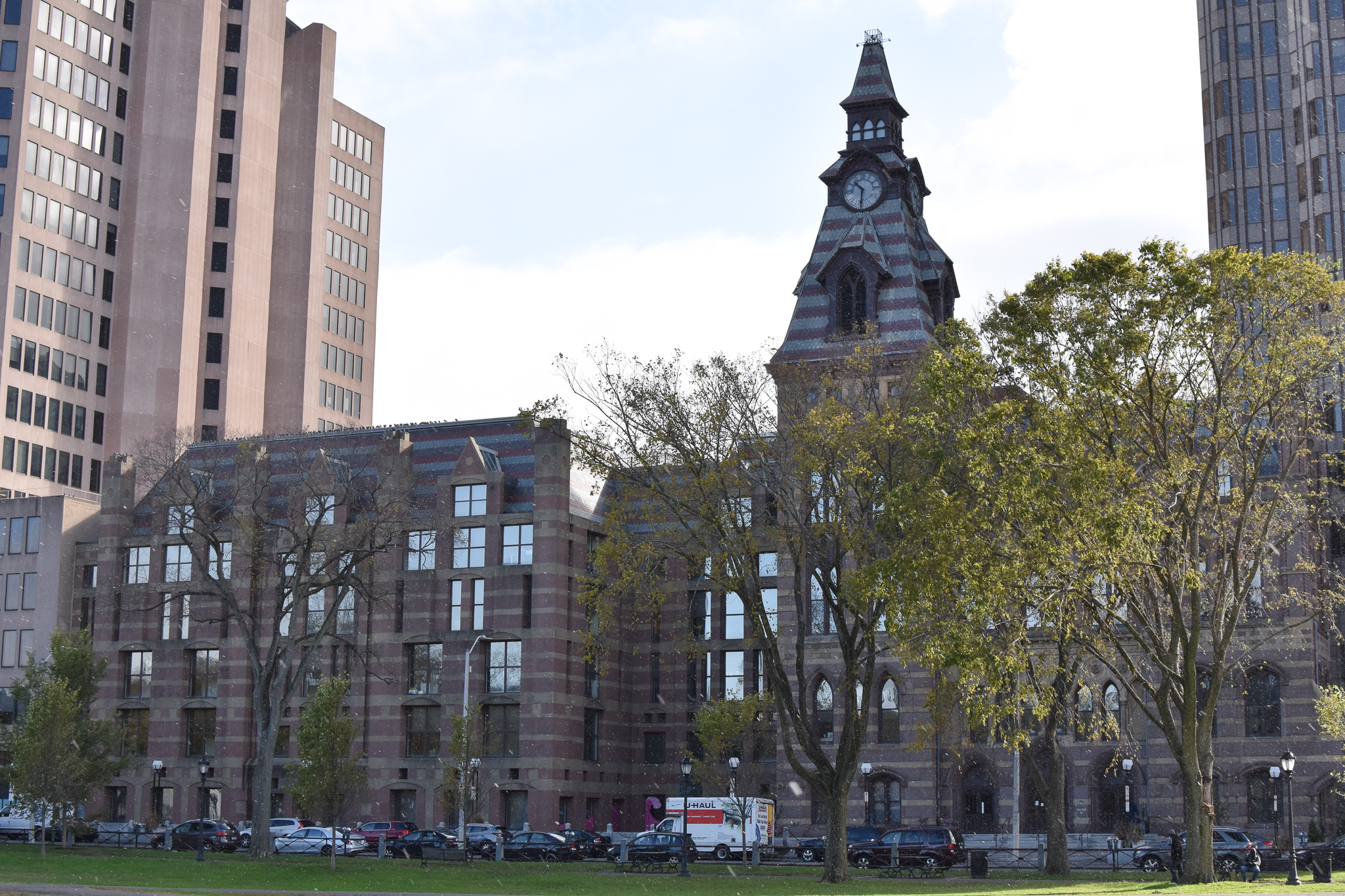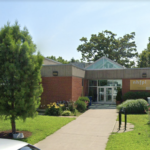
Karen Lin, Staff Photographer
On Wednesday night, the Board of Alders hosted a finance committee workshop to debate Mayor Justin Elicker’s budget plans for the 2022 fiscal year.
On March 1, Elicker proposed two budget plans for the city — the Crisis Budget and the Forward Together Budget. The former would include tax increases for residents and the elimination of some city services, such as the closing of Mitchell Branch Library, East Shore Senior Center and the Whitney Avenue fire station. The Forward Together Budget would maintain funding for many of these city services, but is contingent on increased monetary contributions from Connecticut or from Yale. Alders went into Wednesday’s meeting following another Tuesday hearing where residents expressed their outrage over Yale’s lack of contribution to the city and the cuts that come with the Crisis Budget.
Wednesday night’s meeting was divided into two parts: human services and economic development. Department coordinators gave an overview of their budget, followed by elaboration from groups that work under the coordinators. Each presentation had a question and answer segment for Alders to clarify their concerns. Most presenters said their budget allocation decisions were grounded in the recent legislative agenda from the Board of Alders. This agenda lists five priorities for the next year — jobs for New Haveners, public safety, health equity, environmental justice and quality and affordable housing.
“We are all focused on the Forward Together budget as the one we are working off of,” said Acting City Budget Director Michael Gormany. He reiterated that point throughout the six-hour meeting.
Human Services
In both budgets that Elicker has proposed for the upcoming fiscal year, the Human Services budget will increase. Human Services encompasses the Community Services Administration, Disability Services, Elderly Services, the Fair Rent Commission, Public Health, Youth Services and Recreation and Youth.
Community Services Administrator Mehul Dalal noted the CSA hopes to align its budget allocations with the Board of Alders’s legislative agenda by prioritizing jobs, health equity, housing and city safety.
If the Forward Together budget comes to fruition, the city anticipates a $1.05 million budget for CSA. $125,000 would go towards existing prison reentry programs, while $500,000 would go towards Elicker’s proposed New Haven Community Crisis Response Team.
The Crisis Response Team would consist of social workers, mental health experts and medical health professionals responding to calls of drug abuse, homelessness and mental health as an alternative to a law enforcement response. However, alders at the meeting raised concerns about the amount of money being funneled into the pilot program for the team.
Carlos Sosa-Lombardo, the director of Project Fresh Start — a New Haven-based prison reintegration program — said he was working with CSA on the pilot Crisis Response Team. He added that increased funding would allow the CSA to hire full-time employees, creating a “robust” pilot operation that would accurately portray the impact of such a team. If Forward Together were not approved, Sosa-Lombardo noted, they would be unable to create a pilot program that would effectively evaluate the use of a crisis team.
Gormany also said that $750,000 would go towards the Dixwell Q House’s utilities, building operations, leases and programming for its first year. Ten years ago, the Q House closed due to a lack of funds — but a new building is expected to open this summer, where it will serve as a community center to provide New Haven youth with programming including the arts, athletics and technology.
Residents of the area have expressed excitement over the Q House’s reopening. Alders also showed approval over its reopening, as well as the assistance the house is receiving from local non-profits such as LEAP, an organization that employs college and high school students to provide academic and social enrichment for children outside of schools. Ward 22 Alder Jeannette Morrison noted that the combination of private and government funding the city has used to reopen the Q House is “a wonderful, wonderful model for all the country to follow.”
The Youth and Recreation representatives noted that there would be slight differences between the Crisis and Forward Together budgets in their department. There would be no personnel changes in either case. In Elicker’s Crisis Budget, Youth Sports Grants would decrease by $8,000 and contractual services would decrease by $50,000. Contractual services include the Boy and Girl Scouts, as well as summer school transportation. Gwendolyn Williams, director of Youth and Recreation, noted the importance of youth programs during the pandemic.
“A lot of the court issues we are finding [suggest] that basic needs aren’t being met, and so the young people feel that they have to go out to do whatever they need to do in order to support their household,” Williams said.
Williams said that the Youth and Recreation was able to continue some programming last summer despite the pandemic, and noted that New Haven will be running all their youth camps this summer. They plan to have 21 summer programs and employ 300 youth.
New Haven Director of Public Health Maritza Bond also explained the health department’s budget for the coming fiscal year. Both the Crisis and Forward Together fund allocate $4.2 million to the health department. Bond also said that outside funding for COVID-19 relief and substance abuse programs allowed the department to raise $13,276,000 for Fiscal Year 2021-22.
The only major change for the health department is that three more spots will be added to the current 41 nursing positions. This is to ensure that a nurse is assigned to every school in New Haven. Bond also added that, in alignment with the legislative agenda, the department hopes to reopen public health clinics for non-COVID related issues — including travel, immunization and sexual health clinics.
However, the Crisis Budget poses significant changes for the Department of Elderly Services. It would eliminate a part time position, allocate $40,000 towards the Q House, reduce elderly transportation by $20,000 and close the East Shore Senior Center to save $45,000. If the center closes, the seniors residing there would be given the option of moving to the other two senior centers in the city. Gormany reiterated, however, that the administration is endorsing the Forward Together budget — which would not close the center.
Economic Development
Economic Development Administrator Michael Piscitelli noted that economic development makes up a significant portion of New Haven’s budget. He noted that if the Crisis Budget is approved, his department would consider selling assets — such as empty schools — in order to bring in extra revenue for the city.
“[Our recovery program is] focused on recovery and also the broader and some of the deeper problems we are facing,” Piscitelli said.
He noted the stark rise in unemployment throughout the city and the importance of economic recovery following the pandemic. New Haven Works — an organization that seeks to address unemployment in the city — will continue with the same budget as last year.
Tweed Airport Executive Director Sean Scanlon also spoke about the Tweed Airport Master Plan that was unveiled earlier this month. He added that interest in the airport is “sky high” and that, while the pandemic has slowed down business in air travel, he believes more carriers will look towards servicing New Haven in the future.
For business development, Deputy Director Stephen Fontana reiterated the many projects coming into 2021, including local business openings, new infrastructure, new residential developments and new commercial developments. Those plans include a small business development center to help local entrepreneurs. The Crisis Budget would include a small decrease in funding for business development that would come from cutting part time and temporary positions.
The transportation budget increases slightly in both of Elicker’s new proposals. Funding was added for meter payments — that amounts to about $445,000 increase in funding.
The next budget workshop will be held on April 12.
Ángela Pérez | angela.perez@yale.edu










